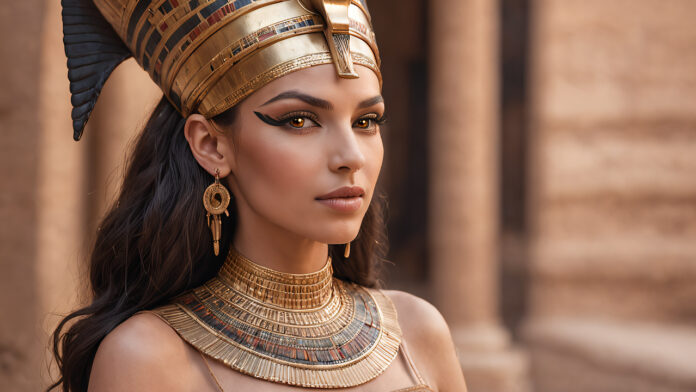Cleopatra, the last pharaoh of ancient Egypt, continues to captivate the imagination with her intelligence, charisma, and influence. In this article, we unravel the enigma surrounding Cleopatra, exploring fascinating facts about her life, reign, achievements, and enduring legacy as one of history’s most iconic women.
Early Life and Lineage
Ptolemaic Dynasty Roots: Cleopatra was born into the Ptolemaic Dynasty, a Greek royal family ruling Egypt after the conquests of Alexander the Great. Her lineage traced back to Ptolemy I Soter, a general under Alexander.
Multicultural Influences: Growing up in Alexandria, Cleopatra was exposed to a diverse array of cultures. Her education included languages, philosophy, and sciences, reflecting the rich intellectual environment of the time.
Cleopatra’s Reign
Joint Rule with Siblings: Cleopatra ascended the throne alongside her younger brother, Ptolemy XIII, after the death of their father. However, political tensions led to her exile, prompting her to seek alliances for her return.
Alliance with Julius Caesar: Cleopatra’s fateful meeting with Julius Caesar in 48 BCE marked a turning point. Their alliance not only restored her to the throne but also established a romantic and political connection between the Egyptian queen and the Roman general.
The Romance with Mark Antony
Alliance and Love: Following Caesar’s assassination, Cleopatra aligned herself with Mark Antony, a prominent Roman general. Their relationship blossomed into a deep love affair, creating a powerful political union that aimed to secure Egypt’s independence.
The Battle of Actium: The union between Cleopatra and Mark Antony faced challenges, leading to the famous Battle of Actium in 31 BCE. The defeat marked the end of their ambitions, ultimately resulting in their tragic demise.
Cleopatra’s Achievements
Cultural Patronage: Cleopatra was a renowned patron of the arts and sciences. Her support for intellectuals and artists contributed to Alexandria’s reputation as a cultural center during her reign.
Architectural Legacy: Cleopatra invested in architectural projects, including the restoration of temples and the construction of new structures. Her efforts aimed to enhance Egypt’s cultural and religious significance.
Cleopatra’s Influence on Fashion
Iconic Style: Cleopatra’s distinctive style became legendary. Her use of extravagant jewelry, elaborate hairstyles, and bold makeup influenced fashion trends not only in ancient Egypt but also in the wider Mediterranean world.
Symbol of Power and Elegance: Cleopatra strategically used fashion as a tool of diplomacy and self-presentation. Her iconic image symbolized both power and elegance, leaving an indelible mark on the perception of female rulers.
Cleopatra’s Relationships with Rome
Political Maneuvering: Cleopatra navigated the complex political landscape of Rome with finesse. Her relationships with Julius Caesar and Mark Antony were instrumental in safeguarding Egypt’s autonomy amid the power struggles in the Roman Republic.
Cleopatra’s Children: Cleopatra bore children from her relationships with Julius Caesar and Mark Antony. Her offspring, particularly her children with Mark Antony—Alexander Helios, Cleopatra Selene II, and Ptolemy Philadelphus—played significant roles in the dynastic history of the time.
Cleopatra’s Legacy
Historical Perspectives: Cleopatra’s legacy has been the subject of diverse interpretations throughout history. Ancient historians, such as Plutarch and Cassius Dio, offered insights into her character, while later depictions in literature and film added layers of romanticism and intrigue.
Influence on Feminism: Cleopatra’s life and reign have resonated with feminist scholars, who have explored her agency, intelligence, and the challenges she faced as a female ruler in a male-dominated world. Her legacy has become a symbol of women’s strength and resilience.
Cleopatra in Popular Culture
Literature and Drama: Cleopatra’s story has inspired numerous literary works, including William Shakespeare’s play “Antony and Cleopatra.” Her portrayal in drama and literature has contributed to shaping her image as a complex and charismatic historical figure.
Cinematic Representations: Cleopatra’s allure has translated onto the silver screen, with actresses like Elizabeth Taylor and Angelina Jolie portraying her in iconic films. These cinematic depictions have added layers of glamour and drama to her historical narrative.
Conclusion: The Eternal Enigma of Cleopatra
In conclusion, Cleopatra remains an eternal enigma, a woman of intelligence, charisma, and political acumen whose life and reign continue to captivate the world. From her early years in Alexandria to the alliances with Rome and her enduring legacy in culture and feminism, Cleopatra’s story is one of resilience and influence. As history’s last pharaoh, she left an indelible mark on ancient Egypt and the pages of history, ensuring her place as one of the most iconic and enigmatic figures of antiquity.

